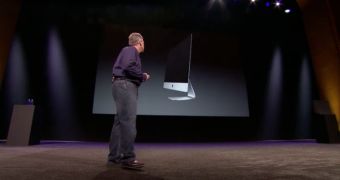At its October 23 event in San Jose, California, Apple introduced five new products, three of which were Macs. The showcase, despite being mainly geared towards the iPad mini, was a big success also thanks to the unveiling of a completely redesigned iMac - Apple’s popular all-in-one desktop computer.
Speaking to Time’s Harry McCracken following the festivities, Apple Senior Vice President of Worldwide Marketing Phil Schiller said, “This is what Apple has always been about, and the Mac has been about, from the first Mac and first iMac.
“It’s always been about making the best Mac we know how. Among the many benefits are making it easy to use and affordable, with great features. This high level of integration is part of delivering on that," he noted.
In order to make the new iMac so insanely thin, Apple had to ditch hefty components that Schiller believes acted like “anchors” on where Apple really wanted to go with the Macintosh line for a while now. One of those parts was the optical disc drive.
“We find the things that have outlived their useful purpose. Our competitors are afraid to remove them. We try to find better solutions — our customers have given us a lot of trust,” he said.
He explained that rotating media in general (including the hard disk drive) has “inherent issues,” noting that “they’re mechanical and sometimes break, they use power and are large.”
By doing away with these old technologies - in the case of the MacBook, replacing hard drives with solid state (flash) storage - “we can create products that are smaller, lighter and consume less power,” Schiller said.
He then elaborated on the Macintosh line in general, suggesting that this particular segment of Apple’s business is finally where they wanted it to be.
“Our approach at Apple has always been to make products we’re proud to own and use ourselves,” he told Time’s McCracken. “We wouldn’t make something cheap or low quality.”
“When the economy is difficult, people care a great deal about the things they spend their money on. Customers have come to understand that Apple’s products aren’t priced high — they’re priced on the value of what we build into them,” Schiller concluded.

 14 DAY TRIAL //
14 DAY TRIAL //